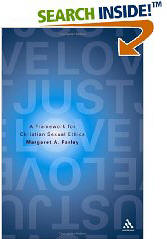|
JUST
LOVE
A
Framework for Christian Sexual Ethics
By Margaret A. Farley
Continuum 2007
 In a 1990
lecture Cardinal Ratzinger, now Pope Benedict XVI, quoted
philosopher Paul Feyerabend to justify the Church’s judgment on
Galileo: “The Church at the time was much
more faithful to reason than Galileo himself, and also took into
consideration the ethical and social consequences of Galileo’s
doctrine. Its verdict against Galileo was rational and just...” In a 1990
lecture Cardinal Ratzinger, now Pope Benedict XVI, quoted
philosopher Paul Feyerabend to justify the Church’s judgment on
Galileo: “The Church at the time was much
more faithful to reason than Galileo himself, and also took into
consideration the ethical and social consequences of Galileo’s
doctrine. Its verdict against Galileo was rational and just...”
The Church was
wrong about Galileo’s conclusions in spite of what the current Pope
says. And the Church is wrong about the ethical basis for its
teaching on human sexuality. Its evaluation of the nature of human
sexuality is woefully deficient and plain wrongheaded—as much as it
was in its estimation of Copernican theory and Galileo’s proofs. We
are now in an epic Copernican-like dispute about another
fundamental reality of nature—sex.
Already in 1986
theologian William Shea outlined the “tangle of issues” that clog
the vital moral agenda for Roman Catholic leadership that has failed
to deal with sex credibly. All the questions have to do with
sexuality: “They are: family life, divorce
and remarriage, premarital and extra-marital sex, birth control,
abortion, homosexuality, masturbation, the role of women in
ministry, their ordination to the priesthood, the celibacy of the
clergy, and the male monopoly of leadership.”
The Catholic
Church, and much of Christianity, lacks the language to dialogue
about these issues and their ethical structure. The Church’s answer
to any ethical reasoning about sex is a distortion—their idea of
natural law—used to render all sexual behavior save intercourse in a
valid marriage open to procreation Intrinsically Evil—a
favorite Vatican epitaph to hurl at any (person or) sexual behavior
not within the scope of their idiosyncratic (if traditional) idea of
natural.
Years ago Jesuit
scholar Christopher Mooney instructed me on the correct
understanding of natural law. It is not grounded on the sex act or
the genitals. Natural law is as Pope John Paul II defined it (even
if he eschews this meaning when he deals with human sexuality),
"It
always has been the conviction of the church that God gave man the
ability to arrive, with the light of his reason, at an understanding
of the fundamental truths about his life and his destiny and,
concretely, at the norms of correct action." That
is natural law. And it goes without saying that sex has to do with
life, destiny and the norms of correct action.
Church
pronouncements inevitably lack credibility when they fail to take
account of physics and biology. Most sincere Catholics do not
consider church teaching about sex reasonable. In fact, the church’s
teachings, and its reasoning on matters sexual are simply not
credible to “the sense of the faithful.” Nor are they workable.
Pope John Paul
II actually forbad bishops to allow the issues listed above to be
discussed.
What has been
missing from Christians’ ability to discuss human sexual ethics
reasonably and in depth has now been supplied by Margaret Farley. In
my estimation she is the Galileo of human sexuality—she outlines a
basis for dialogue about sex, as it is, distinct from the
glib (and inaccurate) appeal to natural law as used by many
theologians.
Farley takes
into account, and respects, the history of ethical
discourse—scriptural, traditional, cultural, and experiential. She
does not shy away from current “hot” topics, but neither does she
get bogged down in idle controversy.
In her own words
she offers a framework for dialogue about sexual ethics “based on
norms of justice.” Norms that “govern all human relationships and
those which are particular to the intimacy of sexual relations.”
This book is a
gigantic contribution to the discourse and understanding of human
sexuality. It is monumental. It turns the entrenched dictates of the
Vatican on their head. It is a perspective that unclogs the tangle
of non-credible pronouncements from Rome, opens the subject of sex
to rational discourse by Christian people, and acknowledges the
direction from which the source of light comes—reason and science
informed by just love open to all—not prohibitions anchored in
archaic and irrational power plays.
Given the
Vatican track record they could burn Farley at the stake in a Yale
courtyard, wait 400 years to recognize her contribution to truth, or
more hopefully, to listen, learn, and start dialoguing according to
a new appreciation of the reality and complexity of sexual nature.
A.W. Richard Sipe |